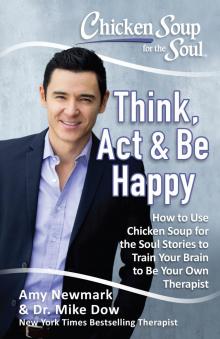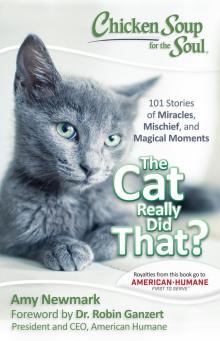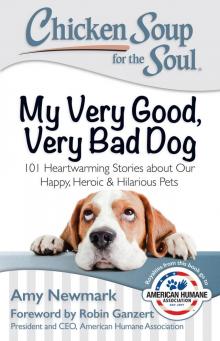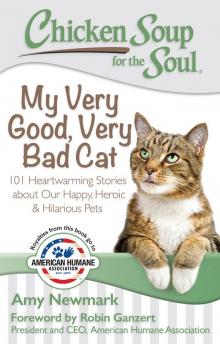- Home
- Amy Newmark
My Very Good, Very Bad Dog Page 6
My Very Good, Very Bad Dog Read online
Page 6
The “doggy eye doctor” (as we liked to call her) ran several tests. She set up an obstacle course for Curley. With the lights on, he was okay. With the lights off, he failed. She had him track cotton balls, dropping them to see if he would track them as they soundlessly hit the ground, and he failed again miserably. She looked deep inside his eyes with her various instruments and then completed her diagnosis. “Your dog is going blind,” she told me bluntly. “He has progressive retinal atrophy, or PRA. There is no cure. He has maybe six months to a year left of sight, and then he will be completely blind.”
“But he’s only five years old,” I said. “Isn’t he too young for something like this?” The doctor explained that PRA happens at any age, and we would have to move forward from here. “Don’t move the furniture around. Keep encouraging him, and he’ll be fine,” she assured me. My heart broke. It just seemed so unfair. Curley had finally settled into a new life with a family that he could trust and he was so happy. Now this? I was devastated. “I’m sorry,” I told her. “This is so upsetting. He’s a very special dog, and I just don’t want to see him struggle through one more thing.”
The doctor broke out of her “clinical doctor mode” and actually got real. She looked at me with compassion and said, “Shawn, he does not know he is going blind. Even if he has less sight day after day, he will accept and adjust to his circumstances with your encouragement and support. Keep doing what you’ve been doing. Trust me. It will be okay.”
Curley has been blind for several years now, and not once has he ever responded to this challenge with any of the behaviors he presented upon adoption. He finds his way around the house with ease. He still “looks” out the car window with the breeze blowing in his hair, blissful and free. He follows me everywhere by tapping his little wet nose across the backs of my legs. As predicted, he adjusted.
I find it all so ironic. Once Curley had true, unfaltering, trusting, never-let-you-down love in his life, he went completely blind without even a whimper. I can’t help but wonder whether, had he been given the same sense of security as a puppy, he might have handled being alone now and then. I mean, could you survive being returned twice? It probably sounds a bit sappy, but Curley is my inspiration.
I experience an important truth when I think about his story: Love makes all the difference. He didn’t have love as a baby. He had no reason to believe that he’d be okay, but now he does and he moves forward in faith — blind faith — with a kind of enthusiasm and hope that reminds me every day that I should trust love, too.
Curley can see that.
~Shawn Lutz
Back to My Roots
Fun fact: Due to overpopulation, many governments charge more for a license if the dog hasn’t been spayed or neutered.
I had always had a passion for animals and I had co-founded an organization to help animals in need. Helping animals through rescue and adoption, and helping their new families through a multitude of programs such as affordable spay-and-neuter options, made me feel alive. I also loved to write in my free time.
Those were my two passions, but I had taken a new job, thinking the additional money would provide a lifetime of security and freedom. All of my effort and energy went into this new office job that I didn’t love, while my rescue organization stagnated and I found I had no time to write.
One bitterly cold winter day, I was heading back to my car between appointments when I saw her. The dog was shivering in the below-zero temperature, and my heart sank. I bent down to pet her and found icicles hanging from her matted fur. Her nails curled into her paw pads, making it difficult to walk. She allowed me to pet her and even spun in circles with excitement. I placed her under my coat to warm her up and I walked from house to house asking if anyone had seen her before.
No one knew anything about her. I left my information at each house just in case, and I took her home. When I took her to the vet, I learned that she had not been spayed or micro-chipped. She was covered in so many fleas that her apricot hair looked gray, and her stomach was full of parasites and worms. The poor thing was severely underweight and dehydrated. Instead of working into the wee hours of the night for my job, I went to buy dog food and spent the evening giving her a bath.
I assumed I would foster the dog myself and place her for adoption with my rescue organization just as soon as she was healthy enough to be spayed and fully vetted. I didn’t have time for a dog in my life. I was too busy with my job, and I was never home. But as each day passed, I couldn’t wait to get home and see the little dog that had wandered into my busy life. We named her Lady, and after a few veterinary visits and a nice haircut, it was determined that she was a Poodle mix. Lady got along well with my cats. She sat on my lap as I worked from home in the evenings, and she snuggled with me when I finally crawled into bed, exhausted.
Lady fit right in, but I reminded myself I did not have time for a dog. I was pursuing financial security, and that meant sticking to my plan, even though I was so unhappy at work.
Each day, Lady grew healthier and stronger, and our bond grew. She loved to go on walks and really loved running with me, which surprised me for a small dog. Rescuing Lady reminded me of my true calling — helping animals — and my other passion for other things, too — running and writing. She reminded me to slow down and actually live life.
A few months after I adopted Lady, I was sexually assaulted at work. Lady helped me find the strength to leave the job and she was there to comfort me through my endless nightmares. It took five years before I was strong enough to seek help in the form of therapy. Once a person full of words, I hadn’t been able to find my own voice since the trauma occurred. But Lady didn’t force me to talk. She did the best thing anyone could have done for me during that difficult time — she stayed by my side and was there for me. When I suffered from debilitating panic attacks, she would sense an attack and jump into my lap, licking my face and forcing me to come back to the present moment instead of allowing the replay of past events to hold me hostage in my mind.
It may have looked as if I saved Lady, but Lady really saved me. I went back to my animal-welfare organization and got it back on track, adding more volunteers and life-saving programs. We officially became a 501(c)(3) organization. I also resumed writing.
Today, our non-profit organization has saved more than 11,000 lives, and I write for a living. Because one furry life found her way to me when I needed her most, I have found the courage and strength to live the life of my dreams.
~Stacey Ritz
One for the Road
Fun fact: Ancient Greek and Roman physicians thought dogs’ saliva had healing properties and could even be an antidote to poisoning.
I had just changed into my running clothes and was leaving my office, off for a run even though it was well over 100 degrees. I couldn’t explain it, but I felt the need to run despite the record heat and my colleague’s admonition not to go.
A quarter-mile into my jog, I saw spots. I admitted defeat and turned around. As I approached my car, in what had been an empty parking lot, I saw an animal circling it.
“Is that a dog?” I asked of no one.
It was a dog, an unintimidating one at that. “Hello,” I said. When I reached for the door handle, the dog disappeared underneath the car into the shade. I grabbed my bottle, desperate for water, took a long swig, and then lowered to my knees to look for the dog. When I stood up, I found it sitting in the driver’s seat, panting.
I reached across him, started the car, and turned the air conditioning on high. I poured water from my bottle into the cap and offered it to him in the driver’s seat. He drained it in a few desperate gulps. I refilled it several times before he had his fill.
“Who do you belong to?” I asked. He wore no collar. “Stay here. I’m going to look for your owner.”
He turned his face toward the vents, relishing the cold air, his moustache blowing.
There was no one in sight. I walked in each direction, toward the river’s edg
e and back. I stood there, looking at the dog staring back at me through the window. He waited patiently as if he’d been in my car dozens of times. I didn’t know what to do. Leaving him in that heat was out of the question. He would die.
“Move over,” I said. The dog moved obediently to the passenger seat. Before I was out of the lot, he had climbed onto my lap. “You stink,” I said. He looked up at me, panting, and then licked my sweaty face. “Ugh! No licking!” He turned his gaze out the window, and I wrapped a protective arm around him for safety. His black fur was warm to the touch and caked with dirt. His unusually long nails dug into my thighs.
“Let’s go figure out what to do with you.”
I was never a dog person, which I often confessed without a trace of shame. “How could you not like dogs?” people asked me. “Easily,” I’d answer. “They smell, they’re loud, and they’re messy, to name a few reasons.” With this attitude, my soon-to-be husband had already resigned himself to the fact that we would never have a dog.
And now one was in my car, on my lap no less! I pulled into my driveway and shrugged as my fiancé saw the dog, his eyes wide at this sudden development.
“Don’t worry,” I said, as I lifted the dog out of the car. “I’m calling animal control.” I set him down in the yard and filled a bowl with cold water. I sat in the shade beside him as he lay on the ground panting heavily. He was lethargic. Upon closer inspection, he appeared quite old, with a Fu Manchu-style moustache, white whiskers and dirty teeth. He didn’t look up when there was a noise, so I assumed he was partially deaf.
We sat together waiting for animal control. The dog didn’t move except to lick my salty face, a foreign sensation that I was already starting to like. I petted him, assuring him that everything would be okay. When animal control arrived, I filled in the representative on how I found the dog. “Also, I think he’s old and possibly deaf,” I added.
She performed some sensory tests, snapping her fingers near his ears and shining a light in his eyes. “He’s not old or deaf,” she concluded. “He has heat stroke.”
Soon after, the dog was loaded into a crate and into the van. I felt a strange mixture of relief and sadness. “What happens now?” I asked.
“His owner has ten days to claim him. After that, he’ll be available for adoption.”
“I’ll look for signs in the area and check the papers and websites. If he has an owner, I want to help find them.”
“Based on his condition and where you found him, my guess is he was abandoned. He’s been a stray for a while now.”
Suddenly, looking at that sweet dog panting in his crate, I realized that this was no chance encounter. I was meant to go running and find him. My heart spoke before my brain could interfere: “If he isn’t claimed, I’ll adopt him.”
Ten days later, I brought Cooper home. He expressed such gratitude to have found his forever home. But it was I who was grateful, for the opportunity to experience such an unexpected bond with an animal.
Learning Cooper’s personality and quirks was entertaining. I had no choice but to acquiesce to the licking. He’s a kisser! Although not always welcome, he usually has good timing. He’s kissed many of my tears away over the years and brought me comfort. Also, he loves the car. A proper mom now, I learned how to secure him in the back seat, but that never stopped him from placing his front paws on the center console and staring attentively out the windshield. He stands guard. No matter how long the drive, he stays on duty the entire time, even if he is exhausted after a day at the beach.
And that is a fortunate thing. I may have saved his life by letting him into my car that hot summer day, but he returned the favor by saving our lives in that same car years later.
We’d spent the day at a picnic an hour north and were headed home late at night. We were both exhausted, struggling to stay awake. “Take a nap, Coop. Mommy’s fine,” I told him. But he wouldn’t nap, nor was I fine.
I fell asleep and veered onto the shoulder. Cooper head-butted me, startling me awake right before we surely would have crashed. I gained control of the vehicle, fully alert from the adrenaline surge, and pulled Cooper’s face against mine. “Thank you, baby,” I said, kissing him. “Good dog. Thank you for saving us.” Terrified, yet relieved, tears fell from my eyes. As always, Cooper promptly licked them away.
“It had to happen this way,” my husband has often said. “She’d have never gone to a shelter and picked a dog.” That hot day, when that angel of a dog appeared from nowhere, truly was a miraculous day for me.
~Jessica A. Walsh
The Fear Factor
Fun fact: The American Society for the Prevention of Cruelty to Animals (ASPCA) is 150 years old, having been founded in 1866 by Henry Bergh.
For my dog’s first birthday, I entered him in a K-9 fun run sponsored by our local Society for the Prevention of Cruelty to Animals (SPCA). I’m not much of a runner, but the run was only a 3K, so I thought it would be fun for both of us.
We practiced in the weeks leading up to the run. On our practice runs, he was always raring to go and usually dragged me along behind him. I worked on his leash manners so that he wouldn’t trip me on the big day. I felt we were ready for anything.
The fun run was downtown amidst the big buildings, so the noise of barking dogs all around us was amplified to a deafening pitch at the start of the race. My dog bolted when the starting tone went off. He had trouble running in the right direction with all the confusion around us. Soon the runners began to thin out, and my dog was running straight and fast. We were passing people and making great time. I was dreaming of a gold-medal finish.
At the halfway point in the course, we turned right, then right again at the next block, and then headed back on the parallel street. When we were six blocks from the finish, my dog screeched to a stop and dropped to the ground like a sack of potatoes. I almost dislocated my shoulder from the sudden stop as I was jerked backward by the leash.
He was lying flat on his belly with his head down in the middle of the intersection. At first I thought something bad had happened to him. He was shaking and whimpering. I did a quick check and couldn’t see anything wrong. I tried to get him up, but he refused. The police officer doing traffic control at the intersection was impatiently motioning for me to move along so he could release the cars.
But I couldn’t get my seventy-five-pound dog to get up. The harder I tried to pry him off the pavement, the more he fought me. I tried to drag him over to the curb, but he was dead weight. The officer was yelling at me. Cars were honking. I pulled and pulled. My dog wouldn’t move.
Finally, I got my arm under him and lifted him up in a fireman’s carry, throwing him over my shoulder. As I staggered to the curb, people at the nearby bus stop were taking my dog’s side. “Poor dog is tired.” “You were running him too hard.” “He needs a ride back.” And laughter. Lots of laughter. I was fuming. My dog would run all day long at the dog park if I let him. He wasn’t the least bit tired. He was scared.
When I adopted him, he and his two siblings had been rescued from death inside a tightly tied black trash bag that someone had dumped on the side of the road. An alert garbage man noticed the bag was moving and used a metal rake to tear open the bag to look inside. My dog and his siblings were only puppies at the time. The rake damaged the nerves in my dog’s back so he limped a little, but he could run as fast as lightning.
Another half-block of carrying my getting-heavier-with-every-step dog brought the answer. A garbage truck was idling at the curb. The sound of it must have hit my dog’s sensitive doggie ears when we turned the second corner. He cried louder and clawed at my back as we drew closer to it. I held on tighter and tried to comfort him. I don’t know where I found the strength, but I ran as fast as I could to get my sweet baby dog away from that scary garbage truck.
I ran with him on my shoulder until I felt him relax, and then I set him down. He wagged his tail in gratitude for me saving him from the garbage truck. We stood there until
I could breathe normally again, and then we ran like maniacs to the finish line. We didn’t win any medals, but I won his trust forever.
~Kathryn Lehan
A Marine’s Mission
Fun fact: The Boston Terrier, an American breed, is a cross between a white English Terrier and an English Bulldog.
My husband John heard about an older Boston Terrier at the Williamson County Animal Shelter and he was determined to rescue him. The dog had been named “Hard Luck Harley” because he had lost his original owner to the war in Iraq and his second owner to a fatal car crash. John asked no more questions because, being a retired Marine, he believed that you take care of your own. Little did he know that Harley would change his life.
Harley was eleven years old and was in the vehicle during the accident that killed his most recent owner. He and another dog survived. Harley had been injured and had bitten one of the rescuers as they were trying to remove him from the vehicle. As a result, Harley had spent the last two weeks in quarantine. When they brought him out to meet John, he waddled over and then lay at John’s feet. John had never seen such a large Boston Terrier. Harley was a whopping thirty-eight pounds, fifty percent above normal.
John did not see an obese senior dog with a mysterious bump on his backside. He saw a dog that needed a new home to live out his final years. John knew there were medical issues but he didn’t care. On the way home, he took Harley to the vet, Dr. McBride, and was advised that Harley had a perennial hernia, which meant that his intestines were extruding into his pelvic area. Dr. McBride advised John to feed Harley soft foods and make sure that he had daily bowel movements. He also said that Harley wouldn’t live long.
Once John and Harley were home, John began to investigate exactly where Harley had been. He knew the date that Harley had arrived at the animal control facility, so he researched accidents with fatalities on that date. There was only one: Rose Marie Gill. Then John learned that Harley had originally belonged to Rose’s son, Steven Patrick Gill, a United States Marine who had been killed in action on July 21, 2005. John was shocked. Fate had placed a Marine’s dog in his care.

 Chicken Soup for the Soul
Chicken Soup for the Soul The Joy of Less
The Joy of Less Hope & Miracles
Hope & Miracles The Cat Really Did That?: 101 Stories of Miracles, Mischief and Magical Moments
The Cat Really Did That?: 101 Stories of Miracles, Mischief and Magical Moments The Joy of Christmas
The Joy of Christmas My Very Good, Very Bad Dog
My Very Good, Very Bad Dog My Very Good, Very Bad Cat
My Very Good, Very Bad Cat